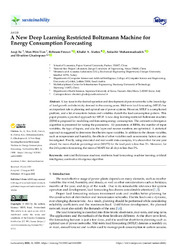A new deep learning restricted boltzmann machine for energy consumption forecasting
| dc.contributor.author | Xu, A. | |
| dc.contributor.author | Tian, M. W. | |
| dc.contributor.author | Firouzi, Behnam | |
| dc.contributor.author | Alattas, K. A. | |
| dc.contributor.author | Mohammadzadeh, A. | |
| dc.contributor.author | Ghaderpour, E. | |
| dc.date.accessioned | 2023-06-16T07:20:32Z | |
| dc.date.available | 2023-06-16T07:20:32Z | |
| dc.date.issued | 2022-08 | |
| dc.identifier.issn | 2071-1050 | en_US |
| dc.identifier.uri | http://hdl.handle.net/10679/8423 | |
| dc.identifier.uri | https://www.mdpi.com/2071-1050/14/16/10081 | |
| dc.description.abstract | A key issue in the desired operation and development of power networks is the knowledge of load growth and electricity demand in the coming years. Mid-term load forecasting (MTLF) has an important rule in planning and optimal use of power systems. However, MTLF is a complicated problem, and a lot of uncertain factors and variables disturb the load consumption pattern. This paper presents a practical approach for MTLF. A new deep learning restricted Boltzmann machine (RBM) is proposed for modelling and forecasting energy consumption. The contrastive divergence algorithm is presented for tuning the parameters. All parameters of RBMs, the number of input variables, the type of inputs, and also the layer and neuron numbers are optimized. A statistical approach is suggested to determine the effective input variables. In addition to the climate variables, such as temperature and humidity, the effects of other variables such as economic factors are also investigated. Finally, using simulated and real-world data examples, it is shown that for one year ahead, the mean absolute percentage error (MAPE) for the load peak is less than 5%. Moreover, for the 24-h pattern forecasting, the mean of MAPE for all days is less than 5%. | en_US |
| dc.description.sponsorship | National Office for Philosophy and Social Sciences | |
| dc.language.iso | eng | en_US |
| dc.publisher | MDPI | en_US |
| dc.relation.ispartof | Sustainability (Switzerland) | |
| dc.rights | Attribution 4.0 International | * |
| dc.rights | openAccess | |
| dc.rights.uri | http://creativecommons.org/licenses/by/4.0/ | * |
| dc.title | A new deep learning restricted boltzmann machine for energy consumption forecasting | en_US |
| dc.type | Article | en_US |
| dc.description.version | Publisher version | en_US |
| dc.peerreviewed | yes | en_US |
| dc.publicationstatus | Published | en_US |
| dc.contributor.department | Özyeğin University | |
| dc.identifier.volume | 14 | en_US |
| dc.identifier.issue | 16 | en_US |
| dc.identifier.wos | WOS:000845537600001 | |
| dc.identifier.doi | 10.3390/su141610081 | en_US |
| dc.subject.keywords | Artificial intelligence | en_US |
| dc.subject.keywords | Contrastive divergence algorithm | en_US |
| dc.subject.keywords | Machine learning | en_US |
| dc.subject.keywords | Mid-term load forecasting | en_US |
| dc.subject.keywords | Restricted Boltzmann machine | en_US |
| dc.identifier.scopus | SCOPUS:2-s2.0-85137816744 | |
| dc.contributor.ozugradstudent | Firouzi, Behnam | |
| dc.relation.publicationcategory | Article - International Refereed Journal - Institutional PhD Student |
Files in this item
This item appears in the following Collection(s)
Share this page




